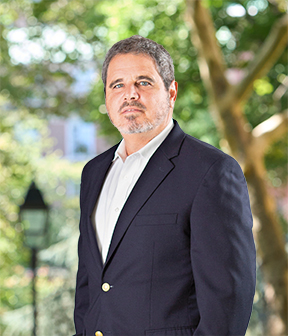An Eye on Private Equity
Gregg Polsky champions fairer approaches to taxing the compensation taken by private equity firms.
In 2014, the Wall Street Journal dubbed Gregg Polsky “a thorn in the side of the private equity industry.” Seven years later, a New York Times piece detailed how several former private equity executives had sought Polsky’s legal advice when they blew the whistle on tax avoidance strategies in their industry.
Polsky, who joins NYU Law from the University of Georgia School of Law this fall as a professor of practice in the Graduate Tax Program, first put the private equity industry under public scrutiny with a Tax Notes piece in 2009. It gave a thumbs-down to a legally gray practice called fee waivers, in which firms waive part of their management fees in return for a larger share of future profits. Polsky began researching private equity and hedge funds while serving as professor in residence in the Internal Revenue Service’s Office of Chief Counsel in Washington, DC, in 2007 and 2008. “After I left,” says Polsky, “I continued to be interested in the private equity piece of it, and then ended up writing a lot of articles related to private equity…[which is] probably some of the work that I’m most proud of.”
Private equity firms typically take a 2 percent management fee from investors, in addition to 20 percent of future profits. As Polsky’s 2009 article explains, because management fees are treated as ordinary income while future profits are taxed at the lower long-term capital gains rate, taking more compensation as future profits reduces the tax liability of private equity executives by almost half. “It’s like laundering your fees into capital gains,” Polsky told the New York Times.
Polsky made further waves with another Tax Notes article in 2014, arguing that monitoring fees, paid to private equity managers for ongoing consulting services, often should be taxed as dividends rather than deducted as ordinary business expenses. That distinction is worth hundreds of millions of dollars annually, he wrote.
Polsky became interested in tax law as a JD student at the University of Florida’s Levin College of Law, where he ended up earning a tax LLM degree in addition to his JD. Tax law’s appeal for him is its pervasiveness, he says: “All of our discretionary spending effectively is done through the tax code, and many of the high interest policy debates are tax-focused, so that’s super interesting.”
After graduating, Polsky worked as a tax associate in White & Case’s Miami office before returning to his alma mater as a visiting assistant professor of law. He went on to achieve tenure at the University of Minnesota Law School before teaching at Florida State University College of Law and the University of North Carolina School of Law.
“Gregg is one of the most intelligent tax minds that I’ve come across,” says Brant Hellwig LLM ’00, faculty director of the Graduate Tax Program, who has co-authored half a dozen articles and a US Supreme Court amicus brief with Polsky. “He’s got technical expertise, so he can get into the weeds…but he can also step back and look at the big-picture aspects of transactions or proposals.”
Polsky co-authored a 2021 article with Professor Daniel Hemel on taxing stock buybacks; a subsequent buybacks tax can be traced directly to that piece, Polsky says. Apart from his work on private equity taxation, he has written about topics such as venture capital tax strategies, corporate transactions, and executive compensation. Polsky’s articles have appeared in journals that include Duke Law Journal, Notre Dame Law Review, Minnesota Law Review, Tax Law Review, Tax Lawyer, Virginia Law Review, Virginia Tax Review, and Yale Journal on Regulation.
As a visiting professor of law at NYU in Fall 2022, Polsky taught Corporate Tax and Taxation of Sub-Chapter S Corporations, both of which he will teach again in his first semester as a faculty member. “Most law schools I’ve been at, there might be one, maybe two other tax people in the building,” says Polsky. “At NYU there will be so many more people who have all these really interesting experiences inside and outside government. It’s something that, professionally, is almost unprecedented anywhere else in the country.”—Atticus Gannaway
Posted September 10, 2024. Photo: Eamon Queeney


